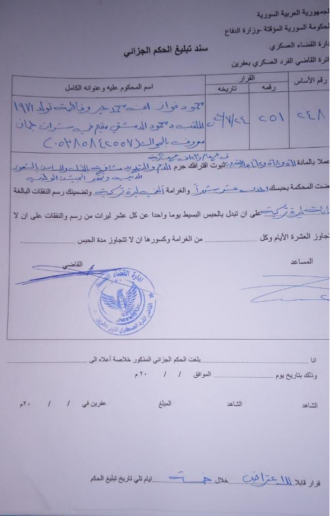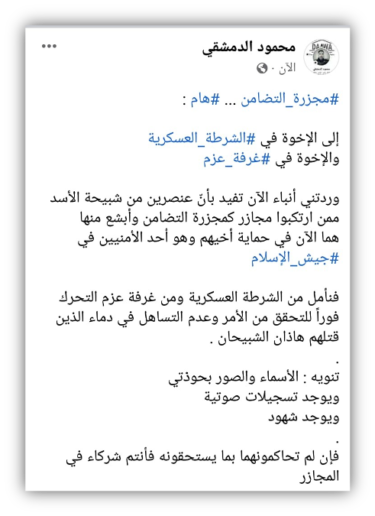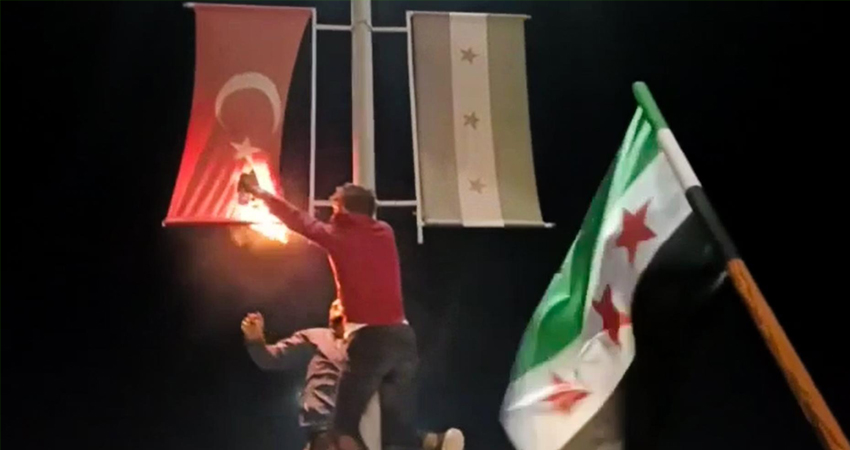August 2022 witnesses unprecedented popular protests in areas occupied by Turkey in northern Syria. The protests were incited by policies, statements and violations made by Turkey and its proxies. In response, the latter arrested dozens of protesters, including students and activists.
In parallel, Syrian refugees in Turkey continue to face pressure from the Turkish government. In June, July, August, and September 2022, Turkey deported (12971) Syrian refugees. Bab al-Salama crossing witnessed (3206) deportations in September, (1878) in August, and (1147) in July.[1] Moreover, Bab Al-Hawa Crossing witnessed (2086) deportations in September, (2712) in August, and (1942) in July.
Among those deported was Syrian lawyer Saladin al-Dabbagh, who was returned to Syria arbitrarily over allegations of offending and denigrating the Turkish people, which the lawyer denied altogether.
Notably, the arrests that followed the protests in northern Syria were mostly made over loose charges, including offending Turkey, hurting religious sentiment, disparaging the national army, offending a friendly country, inciting protests, and weakening national sentiments.
Protests Against Statements Made by the Turkish Foreign Minister Lead to Arrests
On 11 August 2022, the Minister of Foreign Affairs of Turkey, Mevlüt Çavuşoğlu, stated at the conclusion of the 13th conference of Turkish Ambassadors held in Ankara that he had a brief conversation with Syrian Foreign Minister Faisal Mekdad on the sidelines of the Non-Aligned States conference held in Serbia’s Belgrade, last October. Çavuşoğlu asserted that reconciliation must be achieved between the regime and the opposition in Syria and that Turkey supports such a step.[2]
This statement was met by mass protests in northern Syria, especially in the areas under Turkish occupation. Peaceful protests erupted across many towns and villages, among them, Jarabulus, A’zaz, Marea, Al-Rai, al-Bab in northern rural Aleppo (Euphrates Shield areas), as well as Suluk and Tell Abyad (Operation Peace Spring areas) in northern Raqqa. Furthermore, activists in Idlib called residents of the province to protest the next day, 12 August 2022, after Friday prayers. Demonstrators chanted slogans against Turkey and its occupation to northern Syria such as: “Syria is free free”, “Turkey get out of here”, and “We refuse to reconcile”.
The Turkish Army fired live bullets to deter protesters. Live fire, used against protestors, was reported on 12 August 2022 in Jarabulus, while thousands were protesting near a Syria-Turkey border crossing. Investigating this, testimonies obtained by STJ confirmed that the bullets were fired by Turkish forces stationed at the crossing. In a tweet, the governor of Turkey’s Gaziantep, Davut GÜL, accused the Syrian National Army (SNA) of firing live bullets to disperse protesters.

Image 1- A tweet by the governor of Turkey’s Gaziantep accusing the SNA of firing live bullets at the protesters.
On Saturday 13 August 2022, the Civil Police and the Military Police arrested more than ten people in Jarabulus following the Friday demonstrations against the Turkish Foreign Minister’s statement. However, those arrested were released the next day.
One of the protesters who was arrested by the Civil Police in Jarabulus told STJ:
“The Turkish Army started shooting at the protestors as they approached the Jarabulus (Qarameesh) border crossing. The Army shot above the heads of the demonstrators, not directly towards them, as it only wanted to intimidate the protesters and force them to step back.”
The source was sure that the soldiers that fired at the protesters were of the Turkish Army because of their fatigues. He added:
“The number of the protesters was large, which terrified the Turkish Army, knowing that there were dozens of SNA members were controlling the demonstration.”
The source went on to say that the Civil Police arrested him on 13 August 2022 over the accusation of inciting protests and released him the next day after he signed a pledge not to incite protests and chant slogans against Turkey again.
The demonstrations that broke out in northern Syria prompted Turkey’s Foreign Minister to make a new statement in which he said: “The Syrian opposition trusts Turkey, since it has never let them down. Understanding is a condition for establishing lasting peace and stability in Syria.”
Syrians Arrested for Burning the Turkish Flag
During the protests of 11 August 2022 in northern Syria, some protestors burned Turkish flags. Among the flag burners were two in A’zaz who appeared in a video published on the internet.
In response to the burning of the Turkish flash, the leader of the al-Hamza/al-Hamzat Division, Sayf Abu Bakr, tweeted that the Turkish flag is sacred and that they will prosecute those who offend it and hold them accountable.

Image 2- A tweet by Sayf Abu Bakr vowing to pursue the Turkish flag-burners in northern Syria.
A Civil Police officer in A’zaz commented exclusively to STJ on the incidents of burning the Turkish flag and arresting perpetrators saying:
“On Thursday, 11 August 2022, the Turkish liaison officer ordered us to mobilize fully toward identifying those involved in burning the Turkish flag in order to arrest them. The Turkish intelligence and the Ministry of the Interior ordered the arrest of the perpetrators in order to hold them accountable.”
The source added that the Civilian Police captain, M. Naddaf, followed the Turkish orders and arrested two young men, A. H. and M. H., who burned the Turkish flag in A’zaz:
“The two young men were arrested and handed over to the Turkish Counter-Terrorism Service in the Syrian territories on charges of offending a friendly country.”
The source explained that Turkey’s concern was only to report news of arresting those responsible for burning the Turkish flag even if it would pin the accusation on anyone, thus it made arbitrary arrests over this charge. The same source suggested that those arrested may be taken to Turkey.[3]
The source concluded that Turkey arrested only civilians, leaving alone dozens of opposition armed groups members who also took part in the protests, who were mostly affiliated with the Levant Front/al-Jabha al-Shamiya.
On 13 August 2022, the Turkish Interior Minister, Süleyman Soylu, stated in a tweet that the Military Police in northern Syria helped in arresting those suspected of burning the Turkish flag and that attempts to track down more perpetrators were ongoing.

Image 3- A tweet by the Turkish Interior Minister, Süleyman Soylu on the incidents of burning the Turkish flags in Syria.
On 02 August 2022, several areas in northern Syria witnessed demonstrations that demanded the release of detainees who were arrested after the recent protests in the city.
In mid-October 2022, STJ interviewed a person close to detainee M.H. who stated:
“The two people accused of burning the Turkish flag were arrested by the Northern Storm Brigade and the Turkish intelligence service (MIT). They were interrogated and photographed. After several days, they were forced to sign a pledge that they would not participate in any upcoming protests against Turkey. Then they were released”.
Offending Turkey; the New Old Accusation
On 9 August 2022, Enab Baladi published a report on a circular by the Counter-Terrorism Department. The circulation contained the names of six Syrians wanted for offending Turkey by erasing the slogan “Fraternity has No Limits” written on the building of the Directorate of Education in A’zaz and removing the Turkish flag from above it.
Enab Baladi’s correspondent reported that the six wanted are high school students in A’zaz and Marea and that the circular came after dozens of high school students demonstrated in the region during the past few days, protesting the results of the final high school exam and the high repetition rates.
In mid-August 2022, STJ conducted an online interview with a source familiar with the incident and the reasons for the issuance of arrest warrants against the students, he recounted:
“Students who sit the examination for the general certificate in secondary education felt wronged and aggrieved because the repetition rate was 90 per cent this year. Thus, a number of students demonstrated in front of the Directorate of Education in A’zaz and erased the slogan “Fraternity has No Limits” written on its wall and part of the Turkish flag. Furthermore, the students wrote slogans against the Directorate of Education and the local councils affiliated to Turkey like ‘Down local councils’. That prompted the Counter-Terrorism Service to pursue them. In addition to the Counter-Terrorism Service, the Syrian areas under the Turkish influence also have Intelligence Service, military intelligence service, and a Criminal Investigations and security department. All are linked to Turkish governors in the area.”
Regarding the competence of the Counter-Terrorism Service, the source said that it generally deals with the cases of people accused of involvement in bombings in the area and people accused with working for the Syrian government, the Autonomous Administration, or the Islamic State (the clandestine cells), as well as those involved in demonstrations and civil disobedience.
About ten days after the arrest of the students, the Northern Storm Brigade mediated the resolution of this problem between the Turkish Intelligence Service and the students. The Brigade summoned the students with their parents to sign a pledge not to write such slogans again.
Hurting Religious Sentiment and Disparaging the National Army are New Charges in Northern Syria
On 20 August 2022, Syrian activist Mahmoud al-Demashqi published an image on his personal Facebook account with a caption saying: “A notification of a criminal ruling on charges that I did not commit”. The activist confirmed that the plaintiffs were members of the SNA.
STJ reviewed the notification and found that it was issued on 24 July 2022, by the single military judge in Afrin. The notification said that it was issued under Articles 561, 568 and 462 in terms of Article 208 (General Penal Code) and Article 123 (Military Penal Code). The charges against the activist were: Defamation, expressing verbal death threats, hurting religious sentiment, and disparaging the national army. The notification stated a sentence of 11 months in prison and a fine of 2,000 Turkish liras against the activist.

Image 4- The image posted by the activist Mahmoud al-Demashqi.
In mid-August 2022, STJ conducted an online interview with a relative of Mahmoud al-Demashqi through which he explained:
“The main cause behind pilling up accusations against Mahmoud was him publishing a video on two members of the Syrian Army who committed crimes in Syria’s south and fled to reside in the opposition’s areas. Mahmoud accused members of the Army of Islam/Jaysh al-Islam of the SNA of covering up the actions of these two offenders. This is not the first time that Mahmoud al-Demashqi has been attacked on the same accusations. He was previously arrested from his home in a very humiliating manner over charges of weakening national sentiments. However, in early August we were shocked to learn that this case against Mahmoud was reopened under new charges.”

Image 5- A post by Mahmoud al-Demashqi accusing the Army of Islam/Jaysh al-Islam of covering up the crimes of perpetrators in southern Syria.
Conclusion and Legal Opinion
The Turkish government has always absolutely denied all the information that proves its occupation to large areas of Syria’s north and northwest. For example, in its reply to the 2020 joint communication from Special Procedures of the Human Rights Council, Turkey denied having effective control over Syrian territories, especially through its proxies; the SNA and the interim government. STJ has repeatedly argued that the state of occupation can be applied to Turkish authorities and their effective control over the Syrian territories. STJ’s position is based on the findings of investigations by the International Commission of Inquiry and the High Commissioner for Human Rights, as well as the realities on the ground.
However, Turkey’s denial of having effective control and thus being an occupying power over the areas addressed in this report, means that it cannot apply its laws there. Thereby, Turkey does not enjoy the right stated in Article 43 of the Hague Regulations of 1907, reinforced by Article 47 of the Fourth Geneva Convention which allows the occupant to establish power and thus to be in charge of insuring public order and safety. Therefore, the Turkish authorities cannot pursue and punish those who burned the Turkish flag in A’zaz and other Syrian areas.
The activation and application of Turkish laws on Syrian citizens, in conjunction with official Turkish statements and positions in this regard, constitutes a clear recognition and confirmation by the Turkish government of its state of occupation in all areas that have a presence of its military forces or those under the control of the armed groups it supports.
Given that the judges’ salaries in Military Judiciary in the Turkish-controlled areas are paid by Turkey,[4] those judges likely care more about satisfying Turkey than anything else. For that reason, the Military Judiciary directed the aforementioned charges against the accused instead of the charge of insulting a foreign country’s flag, which is the one that applies to the act. That was because the judges know that bringing public prosecutions against anybody for insulting a foreign state, its army, its flag, or its national emblem publically, requires a complaint from the aggrieved party, who is the Turkish government in this case. [5] However, it seems that the latter will not submit the complaint to not to appear weak, because doing so requires communication between the ministries of foreign affairs and justice for the two countries (Turkey and Syria).
STJ notes that the charge of “disparaging the National Army” is new and does not exist in the Syrian laws. However, the Military Judiciary’s allegation of basing its accusations on Article 123 of the Syrian Military Penal Code is not accepted because the Article is intended for the Syrian Army of the Syrian government and not applied to the National Army. Article 1 of the Syrian Penal Code stipulates that: “No penalty or precautionary or reform measure shall be imposed for an offence which was not legally designated as such at the time of its commission.” In the same vein, Article 51.1 of the Syrian Constitution in force states: “Punishment shall be personal; no crime and no punishment except by a law.” Furthermore, the Syrian Penal Code sets fines in Syrian pounds, and therefore imposing a fine of two thousand Turkish liras on the convict violates the Syrian Penal Code, which the judiciary in northern Syria claims to apply.
These particulars attest the lack of independence of the judiciary in the areas of Turkish occupation and its absolute subordination to the Turkish government.
Assuming that Turkish authorities are acting according to Article 43 of the Hague Regulations of 1907, ensuring the public order and safety stipulated in it should not be understood that it should be established in favour of the occupation power at the expense of the residents. Any field or legal measures must not aggravate the suffering or worsen the condition of the local population, and any changes or measures of this kind must aim to enhance the enjoyment by the local population of the protection accorded to them in accordance with the provisions of international law.[6]
Based on this proven interpretation of prioritizing the interest of the local population in the occupied areas over the interests of the occupying power, international law requires the occupying power to ensure respect for the provisions of international humanitarian law and human rights to protect the residents of the occupied areas, and not to be lenient in addressing violations against them.[7] In view of the practices and procedures mentioned above, it can be concluded that the arrest measures were not intended to guarantee the interests and protection of the population, but were meant to serve the interests of the occupying power.
[1] In a previous report, STJ mentions an exclusive testimony that describes how the Border Crossing has published statistics under the label “people who voluntarily returned” and distinguished this group from the group who returned “after trying to enter Turkey illegally”.It seems that the border officials avoided mentioning the issue of deportations openly, and were concerned over the growing Turkish military influence in the area.
[2] After the protests that rocked northern Syria, the Turkish media outlets changed the term ‘reconciliation’ to ‘agreement’.
[3] STJ does not have confirmed information about the whereabouts of the people who were arrested and whether or not they were transferred to Turkish territory.
[4] Paragraph 69 of the UN Commission of Inquiry on Syria’s report at the 40th session of the Human Rights Council for the year 2019;
Paragraph 65 of UN Commission of Inquiry on Syria’s report at the 42nd session of the Human Rights Council for the year 2019.
[5] Article 282 of the Syrian Penal Code punishes those who openly disparage a foreign country, its army, flag or national emblem, or who publicly slander or criticize a foreign head of state, its ministers or political representative in Syria by imprisonment from six months to two years and a fine not exceeding two hundred Syrian pounds. However, a complaint from the aggrieved party is a condition for action to be brought against a defendant.
[6] ICRC (1958), Commentary on the Fourth Geneva Convention: Convention (VI) relative to the Protection of Civilian Persons in Time of War [hereinafter ICRC Commentary on GC 1958], p. 274.
[7] ICJ, Armed Activities on the Territory of the Congo (Democratic Republic of the Congo v. Uganda), Judgment, 19 December 2005, ICJ Reports 2005, para. 178.

